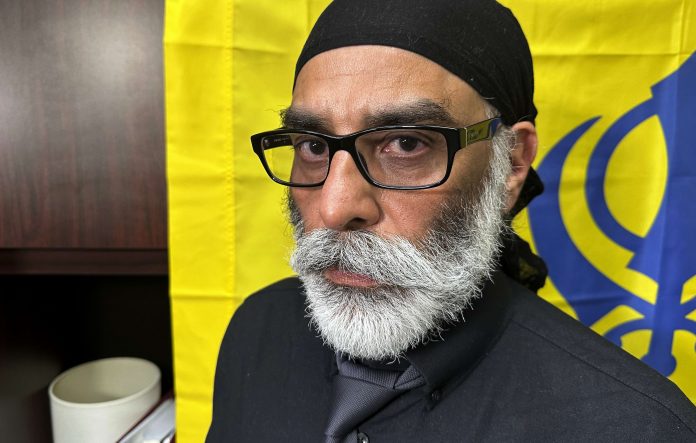
By Larry Neumeister
Associated Press
NEW YORK (AP) — A foiled plot to assassinate a prominent Sikh separatist leader in New York, just days after another activist’s killing, was meant to precede a string of other politically motivated murders in the United States and Canada, according to U.S. prosecutors.
In electronic communications and audio and video calls secretly recorded or obtained by U.S. law enforcement, organizers of the plot talked last spring about plans to kill someone in California and at least three other people in Canada, in addition to the victim in New York, according to an indictment unsealed Wednesday.
The goal was to kill at least four people in the two countries by June 29, and then more after that, prosecutors contend.
After Hardeep Singh Nijjar, a Sikh activist who had been exiled from India, was shot and killed outside a cultural center in Surrey, British Columbia, on June 18, one of the men charged with orchestrating the planned assassinations told a person he had hired as a hitman that he should act urgently to kill another activist, Gurpatwant Singh Pannun.
“We have so many targets,” Nikhil Gupta said in a recorded audio call, according to the indictment. “We have so many targets. But the good news is this, the good news is this: Now no need to wait.”
He urged the hitman to act quickly because Pannun, a U.S. citizen living in New York, would likely be more cautious after Nijjar’s slaying.
“We got the go-ahead to go anytime, even today, tomorrow — as early as possible,” he told a go-between as he instructed the hitman to kill Pannun even if there were other people with him. “Put everyone down,” he said, according to the indictment.
The attack plans were foiled, prosecutors said, because the hitman was actually an undercover U.S. agent.
The U.S. attorney in Manhattan announced charges Wednesday against Gupta, and said in court papers that the plot to kill Pannun was directed by an official in the Indian government. That government official was not charged in the indictment or identified by name, but the court filing described him as a “senior field officer” with responsibilities in security management and intelligence.
Indian officials have denied any complicity in Nijjar’s slaying. External Affairs Ministry spokesperson Arindam Bagchi said Wednesday that the Indian government had set up a high-level inquiry after U.S. authorities raised concerns about the plot to kill Pannun.
Court filings revealed that even before Nijjar’s killing in Canada, U.S. law enforcement officials had become aware of a plot against activists who were advocating for the secession from India of the northern Punjab state, where Sikhs are a majority.
U.S. officials said they began investigating when Gupta, in his search for a hitman, contacted a narcotics trafficker who turned out to be a Drug Enforcement Administration informant.
Over the ensuing weeks, the pair communicated by phone, video and text messages, eventually looping in their hired assassin — the undercover agent.
The Indian government official told Gupta that he had a target in New York and a target in California, the indictment said. They ultimately settled on a $100,000 price and by June 3, Gupta was urging his criminal contact in America to “finish him brother, finish him, don’t take too much time …. push these guys, push these guys … finish the job.”
During a June 9 call, Gupta told the DEA agent that the murder Pannun would change his life because “we will give more bigger job more, more job every month, every month 2-3 job,” according to the indictment.
It was unclear from the indictment whether U.S. authorities had learned anything about the specific plan to kill Nijjar before his ambush on June 18.















